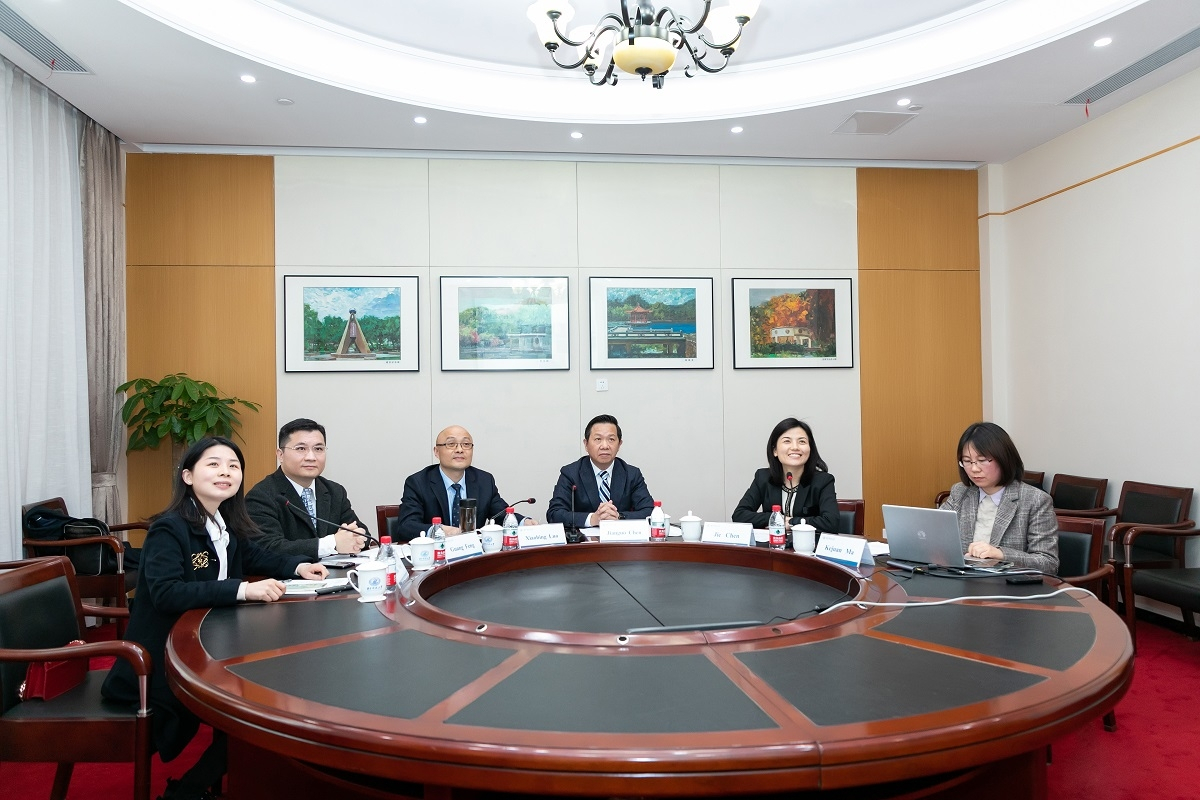St Petersburg University and Huazhong University of Science and Technology Launch a Month of Academic Exchange

Throughout April, scientists from the two universities will participate in symposia and workshops in fields ranging from statistical physics and applied mathematics to ethical issues of genome editing and neuroenhancement.
The opening ceremony of the Month of Academic Exchange was held online. In his welcoming remarks, Chen Jianguo, Vice Chancellor for International Activities at Huazhong University of Science and Technology, thanked his Russian colleagues for their efforts, which made such an event possible. He said that the University is rapidly developing and taking advantage of its strengths in engineering and medicine, as well as humanities and fundamental sciences, and sees international cooperation and exchanges as one of the key means of its development.
St Petersburg University is a prestigious university and one of our most respected Russian partners. We share common interests in engineering and fundamental sciences and strive to find innovative solutions to global challenges.
Chen Jianguo, Vice Chancellor for International Activities at Huazhong University of Science and Technology
’We signed a cooperation agreement in 2012 and since then it has grown rapidly through academic mobility and research in a wide range of disciplines. The start of the month of exchanges will be another bright moment in the history of our joint work. I am confident that our universities can cooperate in accordance with the principles of openness and mutual understanding, in order to conduct more activities together and strengthen interaction,’ said Chen Jianguo.
’We have developed academic exchange programmes, participated in joint conferences, and made every effort to increase our cooperation,’ said Valeriia Malomuzh, Acting Vice-Rector for International Affairs at St Petersburg University. ’Throughout the month of academic exchanges, academics will be discussing topics ranging from energy, physics, and applied mathematics to issues of health communication models based on smart media in everyday life. I am confident that these meetings will provide an opportunity for our researchers to exchange experiences.’
During the meeting, the Dean of the School of Energy and Power Engineering of Huazhong University of Science and Technology spoke about the history and current activities of the unit, which this year celebrates its 70th anniversary. In his turn, Aleksei Titov, Deputy Dean of the Faculty of Physics, informed that it was St Petersburg University that opened one of the oldest departments of physics in Russia: the first courses during the academic year 1746-1747 were taught by Mikhail Lomonosov, a graduate of the University. The modern Department of Physics was created in 1933 on the basis of the institute of the same name that had been opened in 1901. Three of its graduates, Nikolay Semyonov, Lev Landau, and Alexander Prokhorov, went on to win the Nobel Prize. Nowadays St Petersburg University trains highly qualified specialists who will be in demand in any branch of physics. The work of the Department of Statistical Physics, which graduates specialists in almost all fields of modern science, including economics and finance, was presented by its head, Professor Alexander Shchekin, Corresponding Member of the Russian Academy of Sciences.
Huazhong University of Science and Technology was formed in 2000 by merging the former Huazhong University of Science and Technology, founded in 1952, Tongji Medical College, and Wuhan Urban Construction Institute. It has a strong focus on international activities and exchanges: to date, it has established cooperation with over 300 universities and research institutes around the world, including 50 of the world’s top 100 universities. St Petersburg University became a partner of Huazhong University of Science and Technology in 2012, when it signed a framework cooperation agreement and an agreement on academic and scientific exchanges, subsequently renewed in 2015 and 2021. Thanks to these documents, the universities have been able to conduct more than 40 exchanges of specialists representing various fields of knowledge, including energy, biomedicine, healthcare, forensics, public administration, and philosophy.
Mutual visits lay the foundation for practical cooperation. For example, in 2017, Professor Alexander Shchekin visited Huazhong University of Science and Technology at the invitation of the School of Energy and Power Engineering and offered his expertise for the development of academic disciplines. In addition, scientists from the two universities jointly produce many high-quality publications in the fields of engineering, mechanics, energy, and medicine, as well as apply for international programmes.
During the meeting, proposals for further development of cooperation between St Petersburg University and Huazhong University of Science and Technology were presented. In particular, the Chinese colleagues came up with an initiative to: create a joint double-degree academic programme; establish student exchanges; discuss the possibility of seed funding for joint research; and organise cross-days of the partner university.

